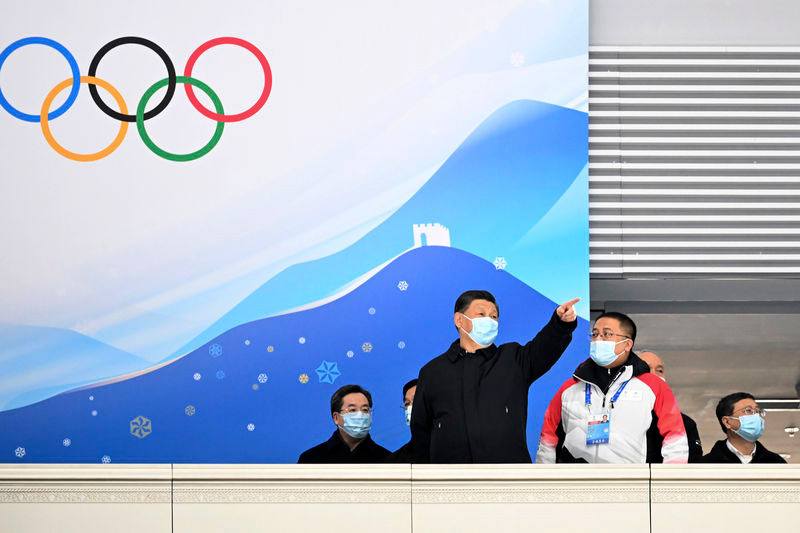
In this photo released by China’s Xinhua News Agency, Chinese President Xi Jinping tours the National Speed Skating Oval, a competition venue for the 2022 Winter Olympics, in Beijing on Jan. 4.
14:21 JST, January 31, 2022
BEIJING — Beijing will be the first city in history to have hosted the Summer and Winter Olympics when the Winter Games start on Feb. 4.
But these are no ordinary Olympics.
The involvement of China’s state leadership is front and center, as President Xi Jinping aims to remain in power atop the Chinese Communist Party as its general secretary.
On Jan. 27, China announced its largest ever Winter Olympics delegation of 387 members, including 176 athletes.
Among the athletes is 17-year-old Su Yiming, dubbed a “genius boy” who could win the gold medal in men’s snowboard big air.
Late last year, he became the first snowboarder from China to win a World Cup competition held in the United States.
A former child actor in the movies, Su continues to be a much talked-about sensation.

Chinese snowboarder Su Yiming, right, strikes a pose with his Japanese coach, Yasuhiro Sato.
On Jan. 21, China Central TV aired a special program about Su, with a title asking if the boy genius can astonish the world.
Su is coached by none other than Yasuhiro Sato, 46, who helped develop Miyabi Onitsuka and Reira Iwabuchi, two of the leading Japanese snowboarders in women’s big air.
All for one
In April 2018, after the close of the Pyeongchang Winter Olympics in South Korea, Sato met Gou Zhongwen, director of the General Administration of Sport of China, in a conference room at the government office in Beijing.
“I would like you to train promising athletes of China,” Gou reportedly said. “Won’t you become a bridge for friendly relations between China and Japan?”
Sato accepted the request on the spot, seeing Gou’s enthusiasm in directly asking a Japanese person to cooperate to improve the competitiveness of Chinese athletes.
Gou, who is seen to be a close aide of Xi, solicited Sato on his own. This was “Chinese-style Olympics led by the nation” at its best, said a senior editorial executive of a Chinese newspaper.
China wanted to make the Pyeongchang Olympics a springboard for the Beijing Winter Games, but China’s results were paltry, with only one gold medal in South Korea.
Inviting foreign coaches was part of China’s measures to recover from the poor showing.
According to Chinese media reports and other sources in 2019, the number of foreign coaches for winter sports in 2014 was 12. This time, China’s Olympic delegation includes 51 foreign coaches from 19 countries, including Japan, the United States and Canada, accounting for more than 60% of China’s Olympic coaches.
Sato, in the end, left China’s athlete development project for the Beijing Olympics after 1½ years because of differences in policies on how to train athletes. At Su’s request, however, he still coaches the teen sensation.
“The high level of enthusiasm in China to prepare as an entire nation is beyond comparison to those of other countries,” Sato said.
Pride, confidence
The Chinese Communist Party administration has placed much importance on the Olympic Games as it can directly raise national pride in China.
At the 2008 Beijing Summer Olympics, the first Games held in China, athletes representing China won 51 gold medals, though three were later taken away. China’s long-cherished desire to win the most golds, topping the United States, was achieved.
The first hosting of an Olympic Games and Chinese athletes’ remarkable results in the midst of China’s high-speed economic growth helped realize the Communist Party’s intention. The people of China acquired the sense and confidence of belonging to a great power.
In autumn 2013, the Beijing city government filed a bid to host the Winter Games. In July 2015, Beijing won over Almaty, Kazakhstan, in the vote to host the 2022 Games. The successful bid was led by Xi, who was then in his first term as the leader.
Just a month before the opening of the 2022 Beijing Games, Xi made a remark that could be interpreted as a supreme order to win gold medals.
Visiting a sports training center in Beijing on Jan. 4 to give words of encouragement to athletes and coaches, Xi said: “We must not only host the Olympic and Paralympic Games, but also make efforts to achieve great results. You must win medals in the best way in terms of competition, morals and dignity.”
The athletes and coaches replied in unison: “Please rest assured, secretary general. We are perfectly prepared.”
That the authorities made them call Xi “secretary general” instead of “president” was an intention to make the medal results helpful to the Chinese Communist Party.
After the end of the Beijing Games, China will enter the political season ahead of the party’s National Congress in the latter half of this year.
If Chinese athletes are able to achieve good results that satisfy China’s pride as the host nation, it can be a tailwind for Xi, who intends to secure an unprecedented third term at the party congress.
For the Xi administration, there can be no alternative to success at the Beijing Olympic Games.
Top Articles in World
-

Israeli Ambassador to Japan Speaks about Japan’s Role in the Reconstruction of Gaza
-

Videos Plagiarized, Reposted with False Subtitles Claiming ‘Ryukyu Belongs to China’; Anti-China False Information Also Posted in Japan
-

North Korea Possibly Launches Ballistic Missile
-

Chinese Embassy in Japan Reiterates Call for Chinese People to Refrain from Traveling to Japan; Call Comes in Wake of ¥400 Mil. Robbery
-

Russia: Visa Required for Visiting Graves in Northern Territories, Lifting of Sanctions Also Necessary
JN ACCESS RANKING
-

Japan PM Takaichi’s Cabinet Resigns en Masse
-

Japan Institute to Use Domestic Commercial Optical Lattice Clock to Set Japan Standard Time
-

Israeli Ambassador to Japan Speaks about Japan’s Role in the Reconstruction of Gaza
-

Man Infected with Measles Reportedly Dined at Restaurant in Tokyo Station
-

Videos Plagiarized, Reposted with False Subtitles Claiming ‘Ryukyu Belongs to China’; Anti-China False Information Also Posted in Japan






















